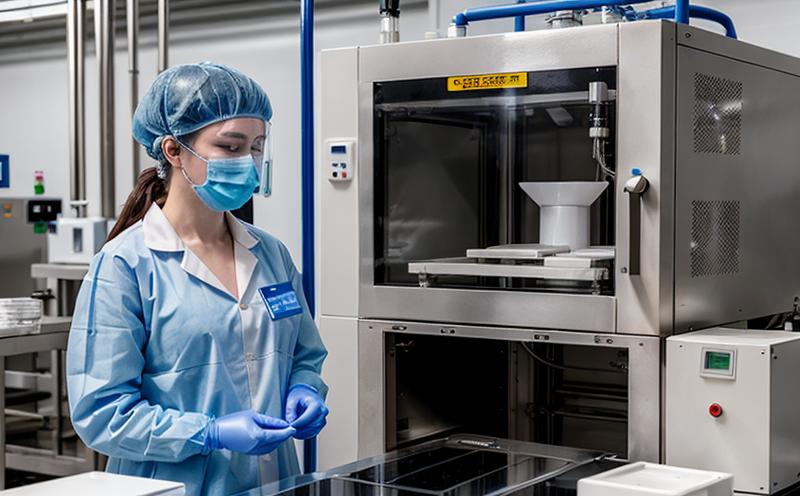GMP Method Validation Testing
Good Manufacturing Practice (GMP) is a set of regulations designed to ensure that pharmaceutical products are consistently produced and controlled according to quality standards. GMP Method Validation Testing plays a crucial role in ensuring that the manufacturing process meets these stringent requirements. This testing ensures that analytical methods used for quality control, stability studies, and release testing are accurate, precise, robust, specific, and reproducible.
Method validation involves several key steps: selection of appropriate analytical procedures, development of standard operating procedures (SOPs), qualification of the equipment and facilities, calibration of instruments, and performance evaluation. The goal is to demonstrate that a method can consistently provide results with accuracy, precision, linearity, range, specificity, robustness, and reproducibility within established limits.
For pharmaceutical companies, GMP compliance is non-negotiable. Regulatory bodies such as the FDA, EMA, and WHO require rigorous validation of analytical methods to ensure product quality. This includes not only the method itself but also the entire process from sample preparation through analysis and reporting. The stakes are high: any failure in this area can lead to production delays, recalls, or even legal action.
Our GMP Method Validation Testing service offers comprehensive support for pharmaceutical companies aiming to meet these stringent requirements. We work closely with our clients to understand their unique needs and develop tailored validation protocols that align with both internal and external regulatory expectations. Our team of experts uses state-of-the-art equipment and follows internationally recognized guidelines to ensure the highest quality standards are met.
Here’s a brief overview of what we cover in our GMP Method Validation Testing:
- Sample preparation
- Analytical method selection
- SOP development and review
- Equipment calibration and qualification
- Method performance evaluation
- Data analysis and reporting
We adhere to several internationally recognized standards including ISO/IEC 17025, ICH Q3A, and FDA 21 CFR Part 11. These standards provide a framework for ensuring that our validation processes are robust and consistent.
Our methodology ensures that the analytical methods used in pharmaceutical manufacturing are reliable and meet all necessary regulatory requirements. By partnering with us, your organization can benefit from expert guidance throughout the entire method development and validation process.
Applied Standards
| Standard | Description |
|---|---|
| ICH Q3A | Guideline for the validation of analytical procedures: Methodology. |
| FDA 21 CFR Part 11 | Electronic Records; Electronic Signatures. |
| ISO/IEC 17025 | General requirements for the competence of testing and calibration laboratories. |
The standards we apply in our GMP Method Validation Testing are designed to ensure that all analytical methods meet stringent quality criteria. These include ICH Q3A, which provides guidance on validating analytical procedures; FDA 21 CFR Part 11, which ensures the integrity of electronic records and signatures; and ISO/IEC 17025, which sets general requirements for laboratory competence.
By adhering to these standards, we ensure that our testing methods are not only reliable but also compliant with international best practices. This compliance is critical in the pharmaceutical industry where regulatory oversight is comprehensive and non-compliance can have severe consequences.
Quality and Reliability Assurance
The quality of a pharmaceutical product depends heavily on the analytical methods used during its manufacturing process. GMP Method Validation Testing is essential in ensuring that these methods are reliable and consistent. Our service focuses on several key aspects:
- Accuracy: Ensuring that the method provides results that closely match the true value.
- Precision: Demonstrating that repeated measurements under identical conditions yield similar results.
- Linearity: Verifying that the method’s response is proportional to the concentration over a specified range.
- Range: Confirming that the method can accurately measure concentrations within its specified limits.
- Specificity: Ensuring that the method measures only the substance of interest and not other compounds.
- Robustness: Showing that minor changes in experimental conditions do not significantly affect the results.
- Reproducibility: Demonstrating that the same results can be obtained by different analysts using the same method.
To achieve this, we employ a range of advanced analytical techniques including High-Performance Liquid Chromatography (HPLC), Gas Chromatography-Mass Spectrometry (GC-MS), and Fourier Transform Infrared Spectroscopy (FTIR). These tools are selected based on their suitability for the specific analytes involved in each validation project.
Our rigorous approach ensures that every aspect of the method is thoroughly evaluated. This includes not only the analytical process itself but also the entire workflow from sample collection to final analysis. By doing so, we provide clients with confidence that their methods are both reliable and compliant with GMP requirements.
Competitive Advantage and Market Impact
- Informed Decision-Making: Our clients can make informed decisions about their manufacturing processes, ensuring that only validated methods are implemented.
- Compliance Assurance: By adhering to strict standards and guidelines, our service helps pharmaceutical companies avoid costly penalties associated with non-compliance.
- Risk Mitigation: Validated methods reduce the risk of errors in quality control, thereby enhancing product safety and efficacy.
- Innovation Support: Our expertise supports continuous improvement and innovation within manufacturing processes.
The impact of our GMP Method Validation Testing extends beyond individual companies to influence entire sectors. By ensuring that all methods meet the highest standards, we contribute to a more reliable and trustworthy pharmaceutical industry. This enhances consumer trust and supports regulatory compliance across borders.
Our clients benefit from this by gaining a competitive edge in terms of product quality and market reputation. In an increasingly regulated environment, being able to demonstrate adherence to GMP is crucial for maintaining credibility and ensuring long-term success.





